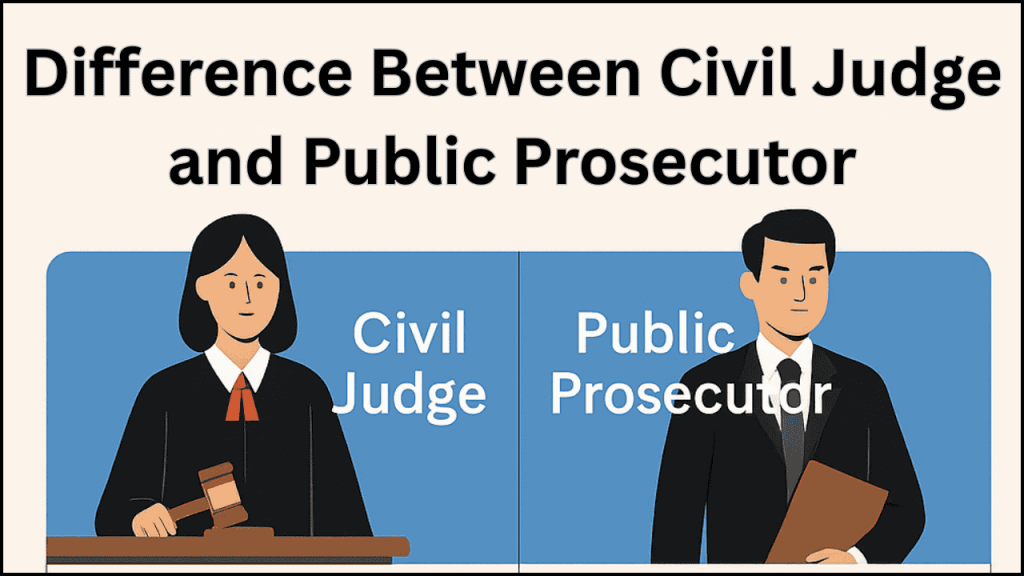
For law students and graduates looking to step into the world of public service, two of the most respected and sought-after roles are Civil Judge and Public Prosecutor. Both careers offer the opportunity to work within the justice system, but they come with distinct responsibilities, qualifications, and growth trajectories. Choosing between these two paths can be a major decision in a legal professional’s life.
In this article, we’ll explore the differences between a Civil Judge and a Public Prosecutor, examining their roles, eligibility, work environment, salary, and career prospects — helping you decide which path suits your skills and interests best.
1. Role and Responsibilities
Civil Judge
A Civil Judge primarily handles civil matters, such as property disputes, contract issues, family law cases, and more. Their key role is to ensure that justice is delivered in accordance with the law and evidence presented. They preside over hearings, evaluate arguments, and deliver judgments in legal disputes between individuals or entities.
Duties include:
- Conducting trials
- Issuing legal orders and judgments
- Interpreting laws
- Managing courtroom proceedings
- Ensuring fair and unbiased justice
At the junior level, civil judges typically serve as Judicial Magistrates and may also handle some minor criminal cases depending on the jurisdiction.
Public Prosecutor
A Public Prosecutor is a government-appointed lawyer who represents the state in criminal trials. Their primary responsibility is to prosecute criminal offenders in court. Unlike judges, prosecutors do not pass judgments; they present evidence and argue the case to prove the guilt of the accused.
Their main duties include:
- Studying police reports and case files
- Preparing legal arguments
- Examining and cross-examining witnesses
- Assisting the court in the fair administration of justice
- Ensuring that the rights of the accused and the victim are upheld
2. Eligibility and Exams
Civil Judge
To become a Civil Judge in India, you must:
- Hold an LLB degree from a recognized university.
- Be enrolled or eligible to enroll with the State Bar Council.
- Clear the Judicial Services Examination conducted by respective state High Courts or Public Service Commissions.
Some states may have specific age limits and require a certain number of years of legal practice.
Public Prosecutor
To become a Public Prosecutor, candidates must:
- Possess an LLB degree.
- Have minimum 7 years of legal practice (may vary by state).
- Pass the recruitment process conducted by the State Public Service Commission or through direct appointments.
Some Public Prosecutor posts may require passing a written exam, interview, and/or viva voce.
3. Work Environment
Civil Judge
Judges enjoy a highly respected status in society and operate from within the judiciary. Their environment is mostly structured, formal, and insulated from external influences. They must maintain a strict code of conduct and impartiality in all cases.
Work hours are generally fixed, but research, reading, and writing judgments may extend beyond courtroom time. Civil Judges are often transferred across districts and states as part of the judicial service.
Public Prosecutor
Public Prosecutors work closely with police, investigating officers, and victims. Their work involves court appearances, preparing arguments, reviewing case materials, and ensuring compliance with legal procedures.
Their schedule can be dynamic and sometimes stressful, particularly in high-profile or serious criminal cases. They work under the Ministry of Law or the Department of Prosecution in their respective states.
4. Salary and Perks
Civil Judge
- Starting salary: ₹70,000 – ₹1,00,000 per month (varies by state)
- Additional benefits: Government accommodation, medical benefits, official vehicle, security, and pension
Judges are classified under Group A gazetted officers and enjoy high social status and job security.
Public Prosecutor
- Starting salary: ₹50,000 – ₹80,000 per month (depending on rank and experience)
- Additional benefits: Dearness allowance, housing allowance, medical reimbursement, and pension
Senior prosecutors, such as Additional or Chief Public Prosecutors, receive higher pay and more responsibilities.
5. Career Growth
Civil Judge
- Promotions: Civil Judge → Senior Civil Judge → District Judge → High Court Judge → Supreme Court Judge (rare but possible)
- Judges also qualify for elevation to higher judiciary through internal promotions or direct recruitment.
Public Prosecutor
- Promotions: Assistant Public Prosecutor → Public Prosecutor → Senior Public Prosecutor → Additional Advocate General (in some states)
- A successful prosecutor may also be appointed as Special Public Prosecutor in significant criminal cases or promoted to senior legal advisory roles.
6. Which One Should You Choose?
Both roles are prestigious and serve vital functions in the justice delivery system, but your choice depends on your interests, temperament, and long-term goals:
- Choose Civil Judge if you enjoy impartial adjudication, legal interpretation, and have strong analytical and decision-making skills. It’s ideal for those who wish to remain neutral arbiters and grow within the judicial hierarchy.
- Choose Public Prosecutor if you’re passionate about criminal law, justice for victims, and courtroom advocacy. It’s well-suited for those who enjoy arguing cases and working closely with law enforcement.